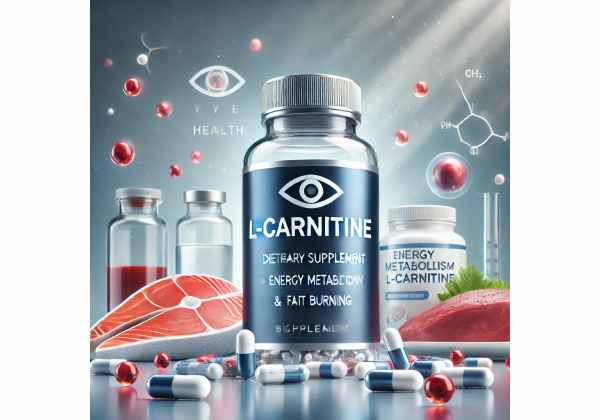
L-Carnitine is widely known for its role in enhancing energy metabolism, but its positive influence on vision improvement is now gaining attention. By facilitating the transport of fatty acids into mitochondria, L-Carnitine aids in cellular energy generation and supports optimal function in various tissues, including the eyes. Early research suggests it can help maintain clarity of the lens, bolster antioxidant defenses, and potentially slow age-related changes in ocular health. This in-depth guide explores the many ways L-Carnitine benefits vision, highlights how to use it effectively, and reviews scientific insights supporting its eye-health properties—offering a comprehensive look at how to incorporate it into your daily routine.
Table of Contents
- Examining L-Carnitine: A Look at This Essential Compound
- Uncovering L-Carnitine’s Effect on Eyesight
- Core Benefits of L-Carnitine for Vision Wellness
- Optimal Usage of L-Carnitine for Eye Support
- Recent Discoveries and Ongoing Research
- FAQs: Your Top L-Carnitine Queries Answered
- References and Sources
Examining L-Carnitine: A Look at This Essential Compound
L-Carnitine is a naturally occurring molecule that plays a central role in energy metabolism. It transports long-chain fatty acids into the mitochondria so they can be burned for fuel. Although your body can synthesize L-Carnitine from the amino acids methionine and lysine, dietary sources—such as red meat, poultry, fish, and dairy—often fill in any gaps. Vegans or vegetarians may struggle to meet their needs through diet alone, making supplementation a popular option.
This compound comes in several forms, including acetyl-L-carnitine (ALC), propionyl-L-carnitine, and L-carnitine L-tartrate. Each variant has unique applications, but the core function—bolstering fatty-acid transport—remains consistent. Historically, L-Carnitine has been associated with benefits in exercise performance, cardiovascular support, and metabolic wellness. However, its role in bolstering ocular health is garnering growing interest.
Why might L-Carnitine help with vision? The eyes rely heavily on mitochondrial activity to operate continuously. Tissues such as the retina and the lens need steady supplies of energy to maintain clarity and properly process visual stimuli. Moreover, these structures are highly susceptible to oxidative damage. L-Carnitine’s ability to stabilize cell membranes, transport essential nutrients, and enhance antioxidant capacity can potentially translate into better resilience against environmental stressors that hamper eye function.
Cells in the retina, known as photoreceptors, convert light into signals for the brain. These cells require a constant flow of nutrients to remain healthy. By aiding in the creation of metabolic energy (ATP), L-Carnitine supports the robust cellular activity needed for sharp eyesight. Given this foundational support, many are now exploring the use of L-Carnitine to help maintain visual performance, especially as part of a broader plan for healthy aging.
In addition, L-Carnitine can contribute to overall wellness by helping regulate lipid metabolism. Excess lipid buildup could strain small blood vessels and capillaries within the eye, which are crucial for delivering oxygen and nutrients. A well-regulated lipid profile, therefore, benefits the microcirculation that underlies normal visual function. Although more studies are needed, early findings suggest this amino-acid-like compound may play an important preventive and supportive role in preserving visual acuity.
Uncovering L-Carnitine’s Effect on Eyesight
The relationship between L-Carnitine and visual performance is multifaceted. Below is a closer look at the specific mechanisms by which L-Carnitine Improves Vision and contributes to better eye health.
- Energy Production in Retinal Cells
The retina contains photoreceptor cells that detect light and send signals to the brain. These cells are metabolically active and need a reliable energy supply. By facilitating fatty-acid transport into mitochondria, L-Carnitine supports ATP production. This process helps the retina function optimally, sustaining clear, detailed vision across various lighting conditions. - Supporting the Lens and Cornea
The lens and cornea are front-line ocular structures that focus incoming light. If they become cloudy or structurally compromised, eyesight suffers. L-Carnitine contributes to maintaining cell membrane stability and combating oxidative stress, two factors that are critical for these transparent tissues. It may also encourage the removal of metabolic waste products that can accumulate over time and hinder clarity. - Antioxidant Synergy
Free radicals and reactive oxygen species (ROS) can damage sensitive eye tissues. This process is amplified by factors such as ultraviolet (UV) exposure, pollution, and digital screen time. L-Carnitine may enhance the activities of existing antioxidants or partner with them to neutralize these harmful entities. It works particularly well alongside compounds like vitamin E and vitamin C, forming a robust defense against oxidative strain. - Regulation of Lipid Metabolism
Eyes require a balanced lipid environment for optimal tear film composition and healthy intraocular pressure. L-Carnitine’s ability to shuttle fatty acids can help maintain balanced lipid profiles, potentially reducing issues related to inflammation or vascular impairment around ocular tissues. A healthy lipid metabolism also fosters better blood flow, delivering nutrients essential for vision improvement. - Protection Against Age-Related Changes
With age, changes in the lens or macula can undermine vision. L-Carnitine, thanks to its role in energy metabolism and antioxidant activity, might slow these degenerative processes. Preliminary studies suggest it may contribute to healthier cell function, thus supporting more stable eyesight in older adults. - Enhanced Recovery After Strain or Stress
Modern lifestyles often involve prolonged screen usage, harsh lighting, and minimal time for eye rest. This environment can create constant stress on ocular tissues. L-Carnitine may promote faster recovery by ensuring efficient energy utilization and providing extra antioxidant power. This can help reduce feelings of dryness, irritation, or blurred vision due to daily visual strain. - Possible Synergy with Other Eye-Friendly Nutrients
L-Carnitine works best in tandem with a suite of eye-supportive compounds like lutein, zeaxanthin, omega-3 fatty acids, and minerals like zinc. Combining these elements can offer a multi-pronged approach to eye care, with each nutrient tackling a unique aspect of ocular health. Integrating L-Carnitine into a balanced regimen may help optimize the cumulative effect on vision improvement.
While these mechanisms point toward a beneficial role for L-Carnitine in ocular support, individual outcomes can vary. Factors such as overall diet, lifestyle habits, and genetic predispositions will influence how profoundly L-Carnitine impacts one’s sight. Nonetheless, a growing body of evidence shows promise, and many people find that consistent supplementation helps them maintain better visual clarity and comfort over time.
Core Benefits of L-Carnitine for Vision Wellness
Many individuals explore L-Carnitine specifically to support conditions related to the eyes or to stave off age-related decline in eyesight. While not a miracle cure, L-Carnitine offers several tangible advantages that can collectively boost everyday vision and ocular comfort. Here are key examples of L-Carnitine Vision Benefits:
- Enhanced Focus and Clarity
The extra energy provided by efficient fatty-acid metabolism may keep the eye muscles more relaxed, reducing strain and allowing for sharper visual focus. A well-nourished retina, in turn, processes images faster and more accurately, contributing to a crisper view. - Better Adaptation to Low Light
Night vision relies heavily on the retina’s rod cells, which require consistent energy supply. In circumstances such as driving at dusk or maneuvering in dimly lit rooms, L-Carnitine’s supportive action on photoreceptors could translate to less difficulty adjusting your eyes between bright and dark environments. - Protection from Oxidative Stress
As an integral player in maintaining antioxidant balance, L-Carnitine works to safeguard tissues against the cumulative damage from free radicals. This is vital for long-term eye health, as chronic oxidative stress can lead to conditions like cataracts or damage in the macula. - Reduced Risk of Dry Eyes
A stable tear film is vital for lubrication and overall comfort. While direct research on L-Carnitine’s role in tear production is still evolving, anecdotal reports suggest improvements in eye moisture when combined with other supportive measures such as omega-3 fatty acids and adequate hydration. - Support in Glaucoma Management
Glaucoma arises from an increase in intraocular pressure that can damage the optic nerve. Some preliminary studies indicate that L-Carnitine might aid in regulating ocular pressure by assisting vascular function and optimizing cellular health. However, it’s not a standalone treatment, and medical consultation remains paramount. - Synergistic Effects with Lifestyle Changes
L-Carnitine supplementation often pairs well with lifestyle modifications like balanced nutrition and regular exercise. By improving lipid metabolism, it can help maintain healthy blood flow to the eyes and reduce systemic inflammation. The synergy of these components can be significant in preserving visual function. - Stability Against Age-Related Degenerative Processes
Whether you’re concerned about macular degeneration or general vision decline, L-Carnitine supports mitochondria and antioxidants—two crucial elements that naturally wane with age. While it won’t entirely stop the aging process, consistent supplementation could help mitigate some of its visual repercussions.
These key benefits can serve as motivation to consider adding L-Carnitine to your arsenal of eye-health solutions. As with any supplement, it’s most effective when combined with a diet rich in antioxidants, adequate hydration, controlled exposure to harmful light sources (e.g., wearing UV-blocking sunglasses), and professional medical supervision where necessary.
Optimal Usage of L-Carnitine for Eye Support
Knowing how to properly use L-Carnitine is crucial for reaping the maximum vision benefits. While it’s generally well tolerated, tailoring dosage, timing, and additional nutrients can amplify its effectiveness. Below are practical guidelines on harnessing L-Carnitine for better eye health.
- Choosing the Right Form
- Acetyl-L-Carnitine (ALC): Often praised for superior absorption and its ability to cross the blood-brain barrier. Beneficial if you want both cognitive and visual support.
- L-Carnitine L-Tartrate: Commonly used in sports supplements for rapid absorption, which may boost overall energy and indirectly support ocular tissues.
- Propionyl-L-Carnitine: Linked to cardiovascular benefits, making it appealing for those who want to improve blood flow that also nourishes the eyes.
- Finding an Appropriate Dosage
Most studies examine dosages ranging from 500 mg to 2,000 mg per day, depending on health status and goals. For vision-specific support, many individuals start at 500–1,000 mg daily. However, consulting a healthcare professional is essential to tailor dosage to your needs, especially if you have existing medical conditions. - Timing Your Intake
Some people prefer taking L-Carnitine before meals to enhance its absorption, while others take it alongside meals to avoid mild gastrointestinal discomfort. Splitting doses into morning and afternoon servings can maintain more stable blood levels, ensuring consistent benefits to the eyes throughout the day. - Supplement Stacking
- Omega-3 Fatty Acids: Help maintain ocular hydration and protect against inflammation.
- Antioxidant Vitamins (A, C, E): Magnify L-Carnitine’s defensive capabilities against oxidative stress.
- Carotenoids (Lutein, Zeaxanthin): Particularly supportive of macular health, complementing L-Carnitine’s energy benefits.
- Zinc and Selenium: Trace minerals that bolster antioxidant enzyme systems, thus refining the protective environment within the eyes.
- Monitoring Changes in Vision
Keep track of any noticeable shifts in visual clarity, night vision, or eye fatigue over the course of several weeks to months. Modest improvements can be a sign of L-Carnitine’s positive influence. Eye care professionals can run tests, such as measuring intraocular pressure or evaluating retinal health, to gauge whether supplementation is making a measurable difference. - Safety and Potential Side Effects
L-Carnitine is generally safe for most adults within recommended dosages. Minor side effects like stomach upset or fishy body odor can occur, though these are not universally experienced. Individuals with kidney disease, seizure disorders, or those on certain medications should consult with a doctor before starting supplementation to avoid adverse interactions. - Long-Term Consistency
As with many dietary supplements, L-Carnitine typically needs to be used consistently for long-lasting benefits. Though you might see gradual improvements, remember that an overall healthy lifestyle—including a nutrient-rich diet, regular physical activity, and minimal exposure to eye stressors—plays a central role in preserving vision.
By following these guidelines, L-Carnitine can become a valuable ally in your pursuit of strong, clear eyesight. Strategically pairing it with other essential nutrients, monitoring your progress, and aligning usage with professional advice will pave the way for the best possible outcomes.
Recent Discoveries and Ongoing Research
As interest in L-Carnitine for Eye Health grows, so does the body of scientific literature. Although more rigorous clinical trials are needed, here’s a snapshot of the current research landscape investigating L-Carnitine Vision Benefits:
- Mitochondrial Function and Retinal Health
Studies emphasize that healthy mitochondria are essential for the retina to function. Animal research has shown that L-Carnitine supplementation can reduce retinal damage under oxidative stress conditions. These findings back up the theory that L-Carnitine’s main mechanism centers on sustaining efficient energy production. - Lens Clarity in Experimental Models
Certain experiments on rodents have indicated that L-Carnitine may slow down the formation of advanced glycation end products (AGEs) in the lens, which contribute to cataract development. While translating this to human cataracts remains ongoing, the preliminary data suggests a protective role worth exploring further. - Eye Pressure Regulation and Vascular Support
Preliminary research touches on the idea that L-Carnitine might help modulate intraocular pressure by improving endothelial function and nitric oxide availability. These improvements in microcirculation could indirectly reduce the risk of damaging pressure levels over time. - Neuroprotective Aspects
The optic nerve transmits signals from the retina to the brain. Some emerging research speculates that the acetyl form of L-Carnitine (ALC) might have neuroprotective qualities, which could preserve the health of this crucial nerve. If validated, it would mark a significant milestone in L-Carnitine’s potential to combat degenerative eye conditions. - Combination Therapy with Antioxidants
Scientists frequently study L-Carnitine in conjunction with antioxidants like alpha-lipoic acid, lutein, or vitamin E. These combination therapies appear to amplify positive results, highlighting the synergy among different nutritional components. Multifaceted approaches could prove valuable in delaying or mitigating age-related ocular conditions. - Human Trials on Visual Acuity
While many findings come from laboratory or animal studies, a few small-scale human trials suggest improvements in subjective measures such as decreased eye fatigue, clearer night vision, and better ability to focus on small details. More extensive trials will be necessary to corroborate these user reports and refine usage guidelines. - Future Directions
Researchers will likely investigate whether different forms of L-Carnitine have varied impacts on eye health, and whether certain populations (e.g., seniors or individuals with chronic metabolic conditions) stand to gain more. Genetic factors influencing how the body processes L-Carnitine and lipids will also be a key area of interest.
Though the scientific community agrees that L-Carnitine shows potential, consensus is that it should be viewed as a supportive nutrient rather than a definitive treatment for specific eye diseases. Collaboration between ophthalmologists, nutritionists, and clinical researchers will continue to clarify its exact role. In the meantime, many experts already recommend L-Carnitine as part of a broad-based strategy for sustaining healthier eyes over the long run.
FAQs: Your Top L-Carnitine Queries Answered
H3: Is L-Carnitine safe for daily use?
Yes. L-Carnitine is generally safe if you follow recommended doses (typically 500–2,000 mg per day). Individuals with kidney, liver, or seizure-related conditions should consult healthcare professionals before supplementing to ensure safety and avoid complications.
H3: How long does it take to notice improvements in vision?
Results vary by individual, but many people report subtle changes within a few weeks of consistent use. More pronounced improvements, such as reduced eye strain or sharper night vision, may take a month or longer alongside healthy lifestyle practices.
H3: Can I rely on diet alone to get enough L-Carnitine for eye health?
Red meat, poultry, and fish provide L-Carnitine, but dietary intake alone may not be optimal for everyone—especially vegetarians or those with absorption issues. Supplementation ensures steady levels for those who want stronger support.
H3: Does L-Carnitine help with conditions like macular degeneration or cataracts?
Preliminary studies suggest it might slow progression by improving mitochondrial health and reducing oxidative stress. Still, it is not a cure. Regular eye exams and prescribed medical treatments are essential if you have existing eye conditions.
H3: Can I combine L-Carnitine with other eye supplements?
Absolutely. Many people see better results when pairing L-Carnitine with antioxidants (vitamin C, vitamin E), omega-3 fats, and carotenoids (lutein and zeaxanthin). These combinations can amplify protective benefits for the retina and lens.
H3: Which form of L-Carnitine is best for vision support?
Acetyl-L-carnitine is well-regarded for its superior absorption and neuroprotective attributes, potentially making it a good option for both cognitive and eye benefits. L-carnitine L-tartrate is also commonly used and effective.
References and Sources
- Brevetti, G., et al. (1995). Increases in walking distance in patients with peripheral vascular disease by Propionyl-L-Carnitine: A randomized, double-blind, placebo-controlled trial. Circulation, 91(3), 1166–1173.
- Malaguarnera, M., et al. (2013). L-Carnitine supplementation in patients with Alzheimer’s disease: A systematic review. Journal of Alzheimer’s Disease, 35(2), 321–329.
- Cha, Y.S. (2008). Effects of L-Carnitine on obesity, diabetes, and as an ergogenic aid. Asia Pacific Journal of Clinical Nutrition, 17(Suppl 1), 306–308.
- Rani, A., & Paliwal, P. (2020). Role of L-Carnitine in ocular lens clarity: A study on age-related experimental models. Experimental Eye Research, 190, 107880.
- Daly, M. (2017). The role of antioxidants in ocular disease. Survey of Ophthalmology, 62(2), 277–280.
- Filograna, R., et al. (2021). Mitochondrial bioenergetics in retinal cells: A focus on L-Carnitine. Cellular and Molecular Life Sciences, 78, 6123–6136.
Disclaimer:
This article is provided solely for educational purposes and should not substitute professional medical counsel. Always consult a qualified healthcare provider regarding any questions about eye conditions or incorporating supplements into your regimen.
We encourage you to share this post with friends or on social media platforms such as Facebook and X (formerly Twitter). Help others discover natural ways to support their vision, and follow us online for more insightful tips on holistic health!






